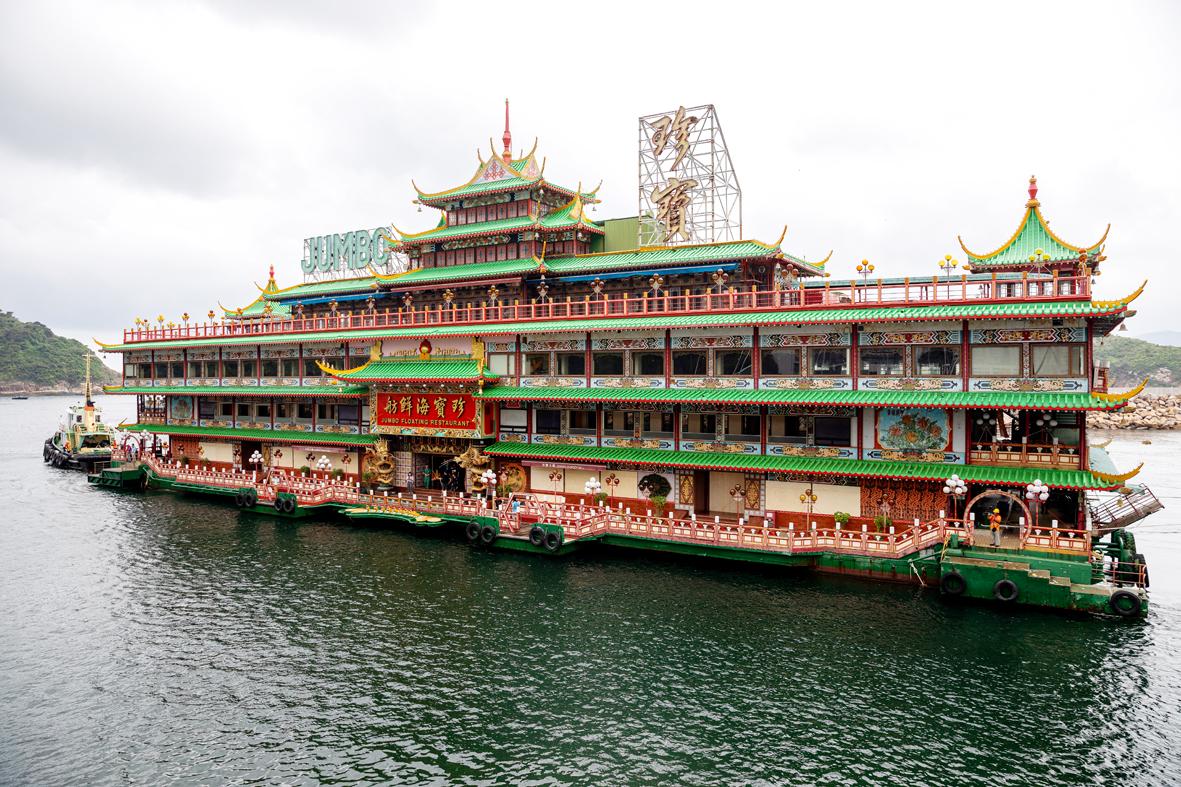Hong Kong’s Jumbo Floating Restaurant, a famed but aging tourist attraction that featured in multiple Cantonese and Hollywood films, was towed out of the city Tuesday after years of revitalization efforts went nowhere.
The buoyant behemoth, which at 76 meters long could house 2,300 diners, set out shortly before noon from the southern Hong Kong Island typhoon shelter where it has sat for nearly half a century. Designed like a Chinese imperial palace and once considered a must-see landmark, the restaurant drew visitors from Queen Elizabeth II to Tom Cruise, and featured in several films — including Steven Soderbergh’s Contagion, about a deadly global pandemic. The lavish restaurant’s operators cited the COVID-19 pandemic as the reason for finally closing its doors in March 2020, after around a decade of financial woes. Restaurant owner Melco International Development announced last month that ahead of its license expiration this month, Jumbo would leave Hong Kong and await a new operator at an undisclosed location.
Under overcast skies, a scattered group of onlookers gathered on the Aberdeen waterfront to see it be dragged away. Watching the restaurant’s ponderous progress across the shelter waters was Mr Wong, a 60-year-old man who said he had come specially to see its departure.

Photo: EPA-EFE
“The exterior was for many years a symbol of Hong Kong,” he said, adding he had eaten there once 20 years ago. “I believe it will come back and I look forward to it.”
Opened in 1976 by the late casino tycoon Stanley Ho (何鴻燊), the Jumbo Floating Restaurant embodied the height of luxury, reportedly costing over HK$30 million (US$3.8 million) to build. It featured a “dragon throne” in the style of the Ming dynasty as well as an opulent mural, according to the South China Morning Post.
The restaurant’s berth in Aberdeen harbor was traditionally a hotspot for seafood eateries — and fierce competition for customers only cooled when Jumbo’s operators acquired its biggest competitor, Tai Pak Floating Restaurant, in the 1980s.
The restaurant was kept afloat by Hong Kong’s booming tourism industry but its popularity had dimmed in recent years even before the coronavirus hit.
Restaurant operator Melco said last month the business had not been profitable since 2013 and cumulative losses had exceeded HK$100 million (US$12.7 million).
It was still costing millions in maintenance fees every year and around a dozen businesses and organizations had declined an invitation to take it over at no charge, Melco added. In her 2020 policy address, Hong Kong leader Carrie Lam (林鄭月娥) announced plans to turn the restaurant over to local theme park Ocean Park for revitalization, but the project fell through after the park said it could not find a suitable operator.
The ailing restaurant’s fate was sealed just days before Lam is set to leave office. In a sign of its dilapidation, on June 1, Jumbo’s kitchen boat listed into the water after a suspected hull breach, tilting almost 90 degrees. The derelict kitchen boat will be left behind, according to local media.

Growing up in a rural, religious community in western Canada, Kyle McCarthy loved hockey, but once he came out at 19, he quit, convinced being openly gay and an active player was untenable. So the 32-year-old says he is “very surprised” by the runaway success of Heated Rivalry, a Canadian-made series about the romance between two closeted gay players in a sport that has historically made gay men feel unwelcome. Ben Baby, the 43-year-old commissioner of the Toronto Gay Hockey Association (TGHA), calls the success of the show — which has catapulted its young lead actors to stardom -- “shocking,” and says

The People’s Republic of China (PRC) invaded Vietnam in 1979, following a year of increasingly tense relations between the two states. Beijing viewed Vietnam’s close relations with Soviet Russia as a threat. One of the pretexts it used was the alleged mistreatment of the ethnic Chinese in Vietnam. Tension between the ethnic Chinese and governments in Vietnam had been ongoing for decades. The French used to play off the Vietnamese against the Chinese as a divide-and-rule strategy. The Saigon government in 1956 compelled all Vietnam-born Chinese to adopt Vietnamese citizenship. It also banned them from 11 trades they had previously

Inside an ordinary-looking townhouse on a narrow road in central Kaohsiung, Tsai A-li (蔡阿李) raised her three children alone for 15 years. As far as the children knew, their father was away working in the US. They were kept in the dark for as long as possible by their mother, for the truth was perhaps too sad and unjust for their young minds to bear. The family home of White Terror victim Ko Chi-hua (柯旗化) is now open to the public. Admission is free and it is just a short walk from the Kaohsiung train station. Walk two blocks south along Jhongshan

Snoop Dogg arrived at Intuit Dome hours before tipoff, long before most fans filled the arena and even before some players. Dressed in a gray suit and black turtleneck, a diamond-encrusted Peacock pendant resting on his chest and purple Chuck Taylor sneakers with gold laces nodding to his lifelong Los Angeles Lakers allegiance, Snoop didn’t rush. He didn’t posture. He waited for his moment to shine as an NBA analyst alongside Reggie Miller and Terry Gannon for Peacock’s recent Golden State Warriors at Los Angeles Clippers broadcast during the second half. With an AP reporter trailing him through the arena for an